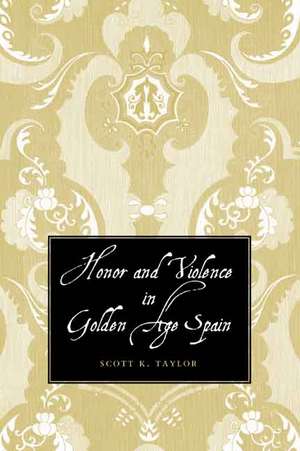Honor and Violence in Golden Age Spain
Autor Scott K. Tayloren Limba Engleză Hardback – 11 noi 2008
Early modern Spain has long been viewed as having a culture obsessed with honor, where a man resorted to violence when his or his wife’s honor was threatened, especially through sexual disgrace. This book—the first to closely examine honor and interpersonal violence in the era—overturns this idea, arguing that the way Spanish men and women actually behaved was very different from the behavior depicted in dueling manuals, law books, and “honor plays” of the period.
Drawing on criminal and other records to assess the character of violence among non-elite Spaniards, historian Scott K. Taylor finds that appealing to honor was a rhetorical strategy, and that insults, gestures, and violence were all part of a varied repertoire that allowed both men and women to decide how to dispute issues of truth and reputation.
Drawing on criminal and other records to assess the character of violence among non-elite Spaniards, historian Scott K. Taylor finds that appealing to honor was a rhetorical strategy, and that insults, gestures, and violence were all part of a varied repertoire that allowed both men and women to decide how to dispute issues of truth and reputation.
Preț: 499.39 lei
Preț vechi: 648.56 lei
-23% Nou
Puncte Express: 749
Preț estimativ în valută:
95.64€ • 98.54$ • 80.12£
95.64€ • 98.54$ • 80.12£
Carte tipărită la comandă
Livrare economică 22 februarie-08 martie
Preluare comenzi: 021 569.72.76
Specificații
ISBN-13: 9780300126853
ISBN-10: 0300126859
Pagini: 320
Dimensiuni: 156 x 235 x 25 mm
Greutate: 0.67 kg
Editura: Yale University Press
Colecția Yale University Press
ISBN-10: 0300126859
Pagini: 320
Dimensiuni: 156 x 235 x 25 mm
Greutate: 0.67 kg
Editura: Yale University Press
Colecția Yale University Press
Notă biografică
Scott K. Taylor is associate professor of history at Siena College. He lives in Albany, NY.
Recenzii
"Taylor has removed one of the serious obstacles to seeing sixteenth-century Mediterranean societies as they really were, rather than as social scientists have supposed."—Helen Nader, University of Arizona
“Refusing to accept the prevailing view of theatre as mirroring reality, Taylor heads for the archives. These tell a different story, showing early modern Spanish society and culture in a new and much more credible light.”—James S. Amelang, Universidad Autónoma, Madrid
“Taylor not only corrects much that is wrong in Spanish historiography, he provides an illuminating example of how to read contemporary sources not as autonomous norms but as living rhetoric embedded in daily practice.”—Ruth MacKay, author of “Lazy Improvident People:” Myth and Reality in the Writing of Spanish History
“Farewell Spanish honor's famous iron code! Taylor proves how supple, pragmatic, and varied was honor's application by the commoners who invoked its prestigious strictures to navigate their daily lives.”—Thomas Cohen, author of Love and Death in Renaissance Italy
"Enormously valuable. . . . It is a thought-provoking reexamination of the stereotypical view of Spanish honor. . . . Taylor's adept study and interdisciplinary approach will be of interest to students of early modern Spanish and European history, literature, anthropology, gender, and society."—Jodi Campbell, Journal of World History
